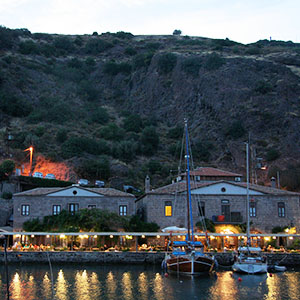Assos and Philosophy
The story about the academy's foundation is as follows:
After the banker Eubulos takes over control over local government of Assos, he soonly declares its independence. After his death his slave Hermenias succeeds him and takes over his position.
During Eubulos' reign he sends his slave Hermenias to Athens to study philosophy under Plato, where Hermenias meets with Aristoteles. When Hermenias takes over control of Assos he invites Aristoteles to come to Assos. Aristoteles leaves for Assos after his tutor Plato dies in the year 347 B.C. There he becomes Hermenias' political advisor and close friend. At the same time, Aristoteles opens a philosophy academy which is unknown in its kind during that period.
Aristoteles' fame spreads quickly through Greece and strikes the attention of Philippus II who is looking for a tutor for his son Alexander the Great in Pella. The famous philosopher feels honoured by the request and accepts Philippus offer, after which he leaves for Pella.
In the year 343 B.C. Aristoteles hears that Hermenias has been tortured to death by the invading Persians, after which he writes an ode in rememberance of his dear friend.
Philosophy in Assos
Nowadays, Assos still keeps up with its tradition of being a philosophical safehaven thanks to the efforts of Örsan K. Öymen. He has chosen Assos for its importance in the history of philosophy as well as for its natural beauty and unspoiled authenthic Aegean culture. The meetings of Philosophy in Assos are organized every year by the Association of Philosophy, Art and Science.Furthermore, Philosophy in Assos, is the first movement,
which brought philosophy back to Assos after thousands of
years when Aristotle taught philosophy here. The aim of
Philosophy in Assos, a non-profit organization, is to gather
philosophers and lovers of philosophy in Assos in order to create an
interactive, a casual and informal atmosphere for talks,
discussions and dialogues on philosophical problems.
They would like to philosophize in a natural atmosphere as was the case in Ancient Greece; distanced from the cruelties of urban life, in harmony with the Aegean nature and culture. Assos, an unspoiled spot on the Aegean coast of Turkey, situated across from the Greek island of Lesbos and south of the ancient ruins of Troy, is an ideal place for achieving this aim; and of course the most interesting aspect of Assos for philosophers is that Aristotle spent several years of his life here. He taught philosophy, practised some of his research in Assos and married the niece of the ruler of the city. In addition, Assos is also the home town of Cleanthes, one of the leading figures of the Stoic movement in Ancient Greek thought.
As a matter of fact, Western Anatolia is one of the most
significant places in the history of philosophy. Thales, Anaximenes
and Anaximander, who are considered the first known philosophers
of western philosophy were from Miletus. So was Leusippus, known as
the leading figure of the atomist philosophy. Anaxagoras, who
according to some scholars introduced philosophy to the
Athenians, was from Klazomenai. Heraclitus, a leading figure
in the history of philosophy was from Ephesus.
MORE INFORMATION ON: www.philosophyinassos.org













